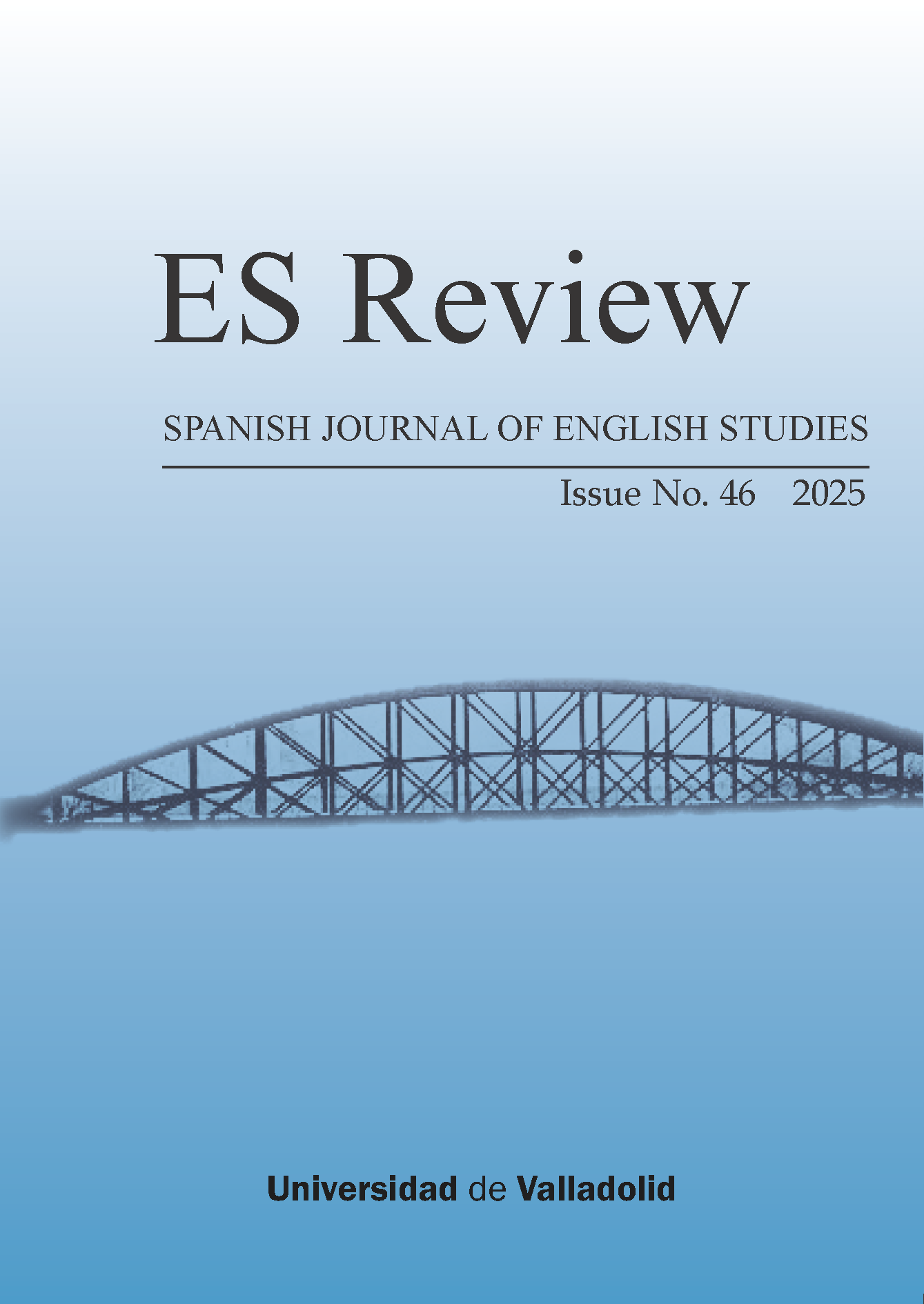Out of Date: Time Travel as Regression for Women in Lauren Beukes’ The Shining Girls
DOI:
https://doi.org/10.24197/gbxycp43Keywords:
Time travel, chrononormativity, women’s rights, backlash, Lauren Beukes, The Shining GirlsAbstract
This paper examines Lauren Beukes’ The Shining Girls (2013) as a reflection on recurrent obstacles to women’s rights. Beukes geometrizes her characters’ temporalities as either linear or circular to convey the conflict between women who fight for equality and the enduring socio-economic forces that block their development as full human beings. Contrary to traditional genderings of time, in Beukes’ work the male chrononaut time-travels in circles to kill promising women, thus embodying backlash discourse and practices that repeatedly jeopardize feminist advances made across time. In contrast, his victims are set in chrononormative linear time to represent women’s struggles for advances in reproductive rights, sexual freedom, and career opportunities.
Downloads
References
Beauvoir, Simone de. The Second Sex. Translated by H.M. Parshley. Jonathan Cape, 1956.
Beukes, Lauren. The Shining Girls. Harper, 2013.
Black, Claire. “Lauren Beukes on Time Travel in The Shining Girls.” Interview with Lauren Beukes. The Scotsman, 1st June 2013, www.scotsman.com/arts-and-culture/lauren-beukes-on-time-travel-in-the-shining-girls-1573120/.
Browne, Victoria. Feminism, Time, and Nonlinear History. Palgrave Macmillan, 2014, doi: 10.1057/9781137413161.
Bryson, Valerie. Gender and the Politics of Time: Feminist Theory and Contemporary Debates. Policy Press, 2007, doi: 10.46692/9781847422972.
Bussière, Kirsten. “Feminist Future: Time Travel in Marge Piercy’s Woman on the Edge of Time.” Journal of Science Fiction, vol. 3, no. 3, 2019, pp. 33–42, publish.lib.umd.edu/index.php/scifi/article/view/
482/.
Butler, Octavia E. Kindred. Beacon Press, 1988.
Caraivan, Luiza. “Portraits of South African Women in Lauren Beukes’ Writings.” Gender Studies, vol. 15, no. 1, 2017, pp. 214–28, doi: 10.1515/genst-2017-0014.
Chiang, Ted. “Story of Your Life.” Stories of Your Life and Others. Tor, 2002.
Donaldson, Eileen. A Chronology of Her Own: The Treatment of Time in Selected Works of Second Wave Feminist Speculative Fiction. 2012. University of Pretoria, PhD dissertation, repository.up.ac.za/
bitstream/handle/2263/28698/thesis.pdf?sequence=1&isAllowed=y/.
Dowe, Phil. “Does Lewis’ Theory of Causation Permit Time Travel?” Philosophies, vol. 94, no. 6, 2021, pp. 87–98, doi: 10.3390/philosophies6040094.
Faludi, Susan. Backlash: The Undeclared War Against American Women. 1991. Three Rivers Press, 2006.
Felski, Rita. Doing Time: Feminist Theory and Postmodern Culture. New York UP, 2000.
Felski, Rita. “Telling Time in Feminist Theory.” Tulsa Studies in Women’s Literature, vol. 21, no. 1, 2002, pp. 21–28, www.jstor.org/stable/4149213/.
Forman, Frieda Johles, and Caoron Sowton, editors. Taking Our Time: Feminist Perspectives on Temporality. Pergamon, 1989.
Freeman, Elizabeth. Time Binds: Queer Temporalities, Queer Histories. Duke UP, 2010, doi: 10.1215/9780822393184.
Göttner-Abendroth, Heide. “Urania – Time and Space of the Stars: The Matriarchal Cosmos through the Lens of Modern Physics.” Taking Our Time: Feminist Perspectives on Temporality, edited by Frieda Johles Forman and Caoron Sowton, Pergamon, 1989, pp. 108–19.
Grosz, Elizabeth. Time Travels: Feminism, Nature, Power. Duke UP, 2005, doi: 10.1215/9780822386551.
Hanley, Richard. “No End in Sight: Causal Loops in Philosophy, Physics and Fiction.” Synthèse, vol. 141, no. 1, 2004, pp. 123–52, www.jstor.org/stable/20118470/.
Heinze, Rüdiger. “Temporal Tourism: Time Travel and Counterfactuality in Literature and Film.” Counterfactual Thinking - Counterfactual Writing, edited by Dorothee Birke, et al., De Gruyter, 2011, pp. 212–26, doi: 10.1515/9783110268669.212.
Hemmings, Clare. Why Stories Matter: The Political Grammar of Feminist Theory. Duke UP, 2011, doi: 10.1215/9780822393702.
Kristeva, Julia. “Women’s Time.” Translated by Alice Jardine and Harry Blake. Signs: Journal of Women in Culture and Society, vol. 7, no. 1, 1981, pp. 13–35, www.jstor.org/stable/3173503/.
Lewis, David. “The Paradoxes of Time Travelling.” American Philosophical Quarterly, vol. 13, no. 2, 1976, pp. 145–52, www.jstor.org/stable/20009616/.
McBean, Sam. Feminism’s Queer Temporalities. Routledge, 2015, doi: 10.4324/9781315761015.
Nahin, Paul J. Time Machines: Time Travel in Physics, Metaphysics, and Science Fiction. Springer-Verlag, 1999.
Piercy, Marge. Woman on the Edge of Time. Women’s Press, 1993.
Piscopo, Jennifer M., and Denise M. Walsh, editors. Signs: Journal of Women in Culture and Society (Symposium: Backlash and the Future of Feminism), vol. 45, no. 2, 2020.
Russ, Joanna. The Female Man. Women’s Press, 1994.
Russ, Joanna. “The Image of Women in Science Fiction.” Science Fiction Criticism: An Anthology of Essential Writings, edited by Rob Latham, Bloomsbury Publishing, 2017, pp. 200–10.
Söderbäck, Fanny. “Revolutionary Time: Revolt as Temporal Return.” Signs: Journal of Women in Culture and Society, vol. 37, no. 2, 2012, pp. 301–24, www.jstor.org/stable/10.1086/661710/.
Slusser, George, and Danièle Chatelain. “Spacetime Geometries: Time Travel and the Modern Geometrical Narrative.” Science Fiction Studies, vol. 22, no. 2, 1995, pp. 161–86, www.jstor.org/stable/4240423/.
Suvin, Darko. “On the Poetics of the Science Fiction Genre.” Science Fiction Criticism: An Anthology of Essential Writings, edited by Rob Latham, Bloomsbury Publishing, 2017, pp. 116–27.
Winterson, Jeanette. Sexing the Cherry. Vintage Books, 1991.
Wittenberg, David. “Time Travel and the Mechanics of Narrative.” Science Fiction Criticism: An Anthology of Essential Writings, edited by Rob Latham, Bloomsbury Publishing, 2017, pp. 149–76.
Downloads
Published
Issue
Section
License
Copyright (c) 2025 María García-Lorenzo

This work is licensed under a Creative Commons Attribution 4.0 International License.
Authors retain publishing rights and grant ES Review. Spanish Journal of English Studies right of first publication.
Simultaneously, all articles and reviews published in ES Review until nº 43 are available under a Creative Commons Attribution-NonCommercial 4.0 International License (CC BY-NC 4.0) while those published from nº 44 onwards will be available under a Creative Commons Attribution 4.0 International License (CC BY 4.0), by which others are allowed to share and use their work with an acknowledgement of the work’s authorship and initial publication in this journal.
In addition, ES Review allows authors to arrange additional contracts for the non-exclusive publication of the journal’s published version of the work (e.g., in a book), with an acknowledgement of its initial publication in this journal. In such a case, authors are required to approach the editor(s)/publisher to request permission.


